Korea ranked second among Organization for Economic Co-operation and Development (OECD) countries for recycling and composting rate (59 percent) in 2013. Despite such efforts, the actual recycling rate in Korea is about less than 40 percent. That's because, during the screening process, the reusable waste is all discarded if they do not satisfy the criteria for pick up. This clearly indicates that practical education for separating waste is necessary. Also, Korea has regarded separating waste as an important task more intensively than other countries like the United States (U.S.) because Korea has no more territory to accommodate landfills.
How is the separation of waste carried out in other countries?
The U.S. throws garbage all together without separation. The U.S. has an extensive landfill and a highly developed disposal method on account of its wide territory. China lately began to enforce trash segregation, which is an autonomous system, starting in Shanghai in July 2019. In Japan, residents have to separate the rubbish into three categories: burnable, non-burnable, and industrial waste. Germany is famous for its intricate separation systems: they even sort out plastic bottles by color.

Standard rules for the separation of recyclable materials
The Ministry of Environment of Korea presented four basic principles of recycling: empty, wipe, sort and separate. The UOS Times would cover detailed tips with real-life examples.
Empty the contents in the container completely. For soju (Korean distilled alcoholic beverage, in English) and beer bottles, wash them thoroughly and take them to a nearby supermarket or convenience store. Then you can receive a deposit, respectively 100 and 130 KRW, for each glass bottle. However, be careful not to throw away containers where drugs were stored. If you dump it anywhere, that could lead to environmental pollution such as water contamination and fish deformity. Remember that taking them to the pharmacy is the best way to discard them.
Wipe or rinse off food scraps and other foreign things. If there is contamination on reusable waste, companies that make recycled raw materials with them reject to pick them up. Till now, for cup noodles, the representative snack of convenience stores, where have you thrown away the used container? That has to be placed in a trash bin for general garbage now as the contaminated container remains to have stains even when rinsed.
Sort recycled materials by type and throw them into proper recycling bins. Did you throw away the leftover bones from fried chicken along with the garbage? Bones are classified as trash since they cannot be processed into feed. The shell of eggs and vegetables, fish bones, and fruit seeds are also common cases where people mistaken them as food waste. There are also some plastic goods that should not be put into recycling bins: lighters, ballpoint pens, and clothes hangers. If we put that into action, it should be a great help in the screening process.
Don't be concerned about a shattered glass cup anymore. Break it into small pieces and wrap it firmly with a newspaper. Then, you can throw it away in a standard trash bag. In addition, some exceptional items have separate, exclusive collection bins: used batteries and fluorescent lamps. These chemical wastes cause serious soil pollution when landfilled, so we have to be extra careful of that. You can usually find the boxes in schools or the local community centers.
Separate all other materials on recycling. At the end of the semester, stacked notebooks may be a headache for students. They may also wonder if the paper that they took notes on can be recycled. In that case, it can be reused by just removing the vinyl-coated cover and the spring Pay special attention to labels on PET bottles. Ever year, there is a severe difficulty in recycling a huge amount of PET with the label. Some labels have the cutoff lines, so you can easily remove them. Plus, you should also be careful when you throw away the delivered packages. If you discard them with the invoice sticker, it cannot merely be difficult to recycle but also there is a risk of personal information being leaked, which includes your name, phone number, and even your address.
Legal Regulations for Sending Out the Waste
Here are some important regulations, especially for exchange students or those who just started to live alone. Korea forbids dumping trash mixed with recyclables or throwing them out in undesignated places. Furthermore, Korea designates a specific time to throw out the trash in front of your house. The set time varies by region, so you should ask your neighbors or community center in advance. For an example, in the case of Dongdaemun-gu, trash should be put out three days a week, between 6 p.m. and 9 p.m. Be aware of that because these rules are compelled by the law, so a fine will be charged for violation. A student of UOS, who lives near the school, has actually paid a fine before. The student said, “One day, I got a bill of monetary penalty for putting out mixed waste, but I couldn’t think of the reason why no matter how hard I thought. Therefore, I called the public official in charge, and she told me there was a small plastic package of snacks. That’s why I had to pay 100,000 KRW.”
According to the Ministry of Environment, increasing the recycling rate by 1 percent can reduce the landfill of seven soccer fields. It could also reduce environmental pollution, which is directly related to our health. Now is the time to put our efforts into action to protect our environment. For those who feel confused about these rules, The UOS Times recommends a mobile application: nae son-an-ui bunlibaechul (Separating method for the waste in my hands, in English).
Jeong Ji-eun
jjen1026@uos.ac.kr

